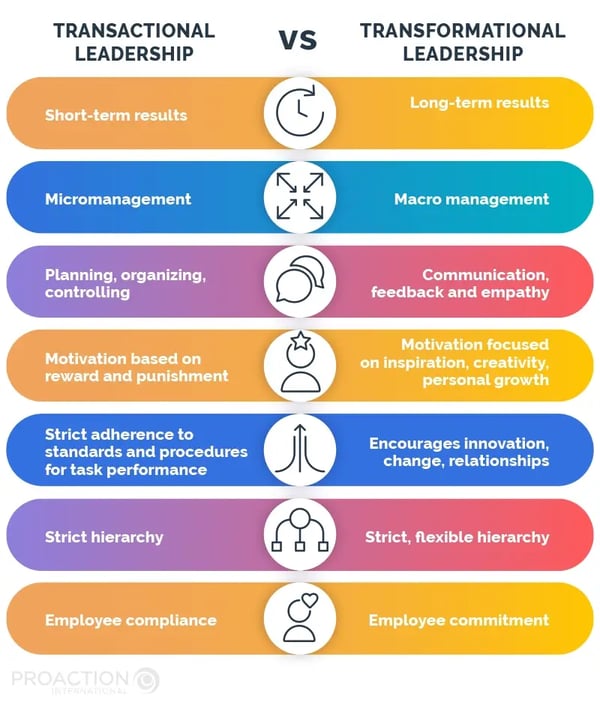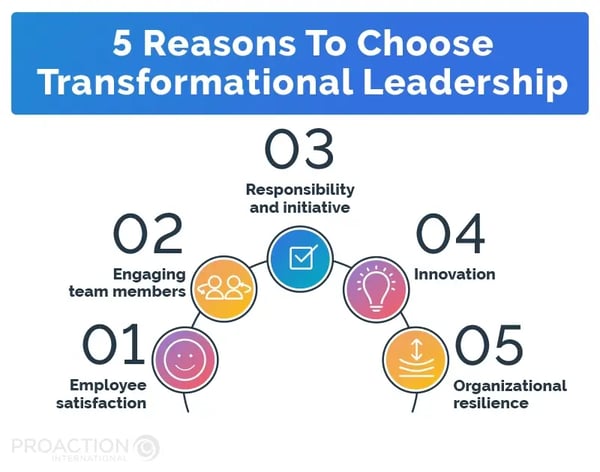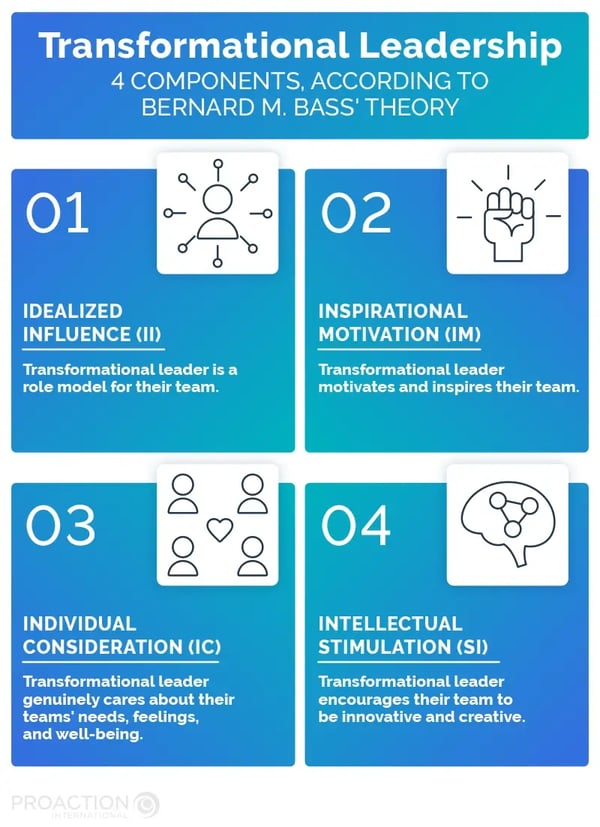Definition and origin of transformational leadership
Transformational leadership is a management style that focuses on creating an inspiring and mobilizing vision capable of transforming and improving people and organizations. Transformational leaders encourage colleagues to look beyond their interests and commit to ambitious common goals. They use innovation, creativity, and calculated risk-taking to reach new heights.
The term "transformational leadership" was coined in the 1970s by the American sociologist James V. Downton, who used it to describe business leaders who pushed their teams to surpass themselves to achieve ambitious future goals.
Later, in 1985, the concept of transformational leadership was widely developed and popularized thanks to the work of American researcher Bernard M. Bass, an expert in leadership and organizational behavior. According to Bass’s transformational leadership theory, transformational leadership can be defined in terms of the leader's influence on his team. They trust him, admire him, and are loyal to him. They respect him for his values and transformational leadership qualities. Their efforts are no longer solely for their gain. They now have a mission and an inspiring direction to drive this work.
What are the 4 hallmarks of transformational leadership style?
According to Bass, transformational style comprises 4 key elements ("The 4 I's"):
- Idealized influence ("II") - Transformational leader is a role model for his team, who trusts them.
- Inspirational motivation ("IM") - Transformational leader motivates and inspires the team by presenting their vision.
- Individual consideration ("IC") - Transformational leader genuinely cares about their team's needs, feelings, and well-being at work and helps them to realize their potential.
- Intellectual stimulation ("IS") - Transformational leaders encourage their team to be innovative and creative, step out of their comfort zones, take risks, and challenge the status quo.

What are the differences between transformational and transactional leadership?
The differences between transactional and transformational leadership lie mainly in their management style.
Firstly, in terms of orientation, transactional leadership focuses on tasks and results, offering rewards and sanctions based on employee performance, whereas transformational leaders focus on inspiration, motivation, and creating a shared vision.
Then in terms of vision. Transactional leaders tend to take a short-term view, focusing on immediate results. Transformational leaders, on the other hand, take a long-term view. They seek to create lasting, meaningful change.
Finally, the communication style used with people under their authority is different. Transactional leaders mainly use directives and instructions. On the other hand, transformational leaders communicate a vision that motivates and mobilizes their team, pushing them to innovate and surpass themselves.
Overall, transactional leaders are there to optimize the company's existing conditions, preserving the way it works while making improvements. Transformational leaders are more about changing these conditions, hence the idea of transformation.
The choice of one or the other depends, above all, on the type of organization:
- The transactional model takes precedence in a bureaucratic environment with strict structure, rules, and procedures or in a company focused on short-term results.
- The transformational model is more appropriate in a more chaotic environment or in a company needing change and/or wishing to focus on the human aspect.

What about the visionary leader?
Transformational leaders and visionary leaders are very similar, but they differ slightly in their approach and focus.
The transformational leader focuses on personal and organizational transformation. Their vocation transforms individuals and the entire organization to achieve an inspiring vision.
The visionary leader focuses more on creating and communicating a long-term strategic vision.
It's important to note that these two leadership styles complement each other and are often found in the same leader, enabling a powerful approach to fostering organizational growth and innovation.
What are transformational leadership skills?
In addition to the elements mentioned above, transformational leaders are also distinguished from other leadership styles by specific soft skills: his visionary side, his empathy, his self-confidence, his ability to inspire his team members, and his communication skills (benevolent communication, constructive feedback).
It fosters a healthy, fair, and ethical work environment. He values authenticity, empowerment, collaboration, self-expression, and personal development. Moreover, his openness to new ideas and ability to question himself enable him to make informed decisions for his company's good.
Transformational leadership examples
Successful transformational leaders can be found in every type of sector and industry, particularly in the fields of technology, media, and information.
Famous names include Oprah Winfrey, Nelson Mandela, Martin Luther King, Nelson Mandela, Barack Obama, Jeff Bezos (Amazon), Elon Musk (Tesla and SpaceX), Reed Hastings (Netflix), Steve Jobs and Tim Cook (Apple), and Claude Onesta (coach of the French handball team).
Whether praised or criticized, these examples of transformational leadership are endowed with extraordinary charisma and enthusiasm. Through how they manage their businesses, they have, each in their way, been able to inspire teams, have a real impact on crowds, develop new innovative ways, convey their vision, and transform the way thousands of people think.
5 reasons to choose transformational leadership
Transformational leadership offers many benefits for both the individual and the organization. Here are the main ones:
1) Employee satisfaction
Sharing common values and objectives greatly improves human resources management. Employees are satisfied and will therefore give their best and be fully committed to their work.
2) Engaging team members
Satisfaction means engagement. Team members are more committed and motivated when they feel connected to a leader they admire and who inspires them.
3) Responsibility and initiative
Employees are no longer passive, but proactive. They develop leadership skills themselves, take responsibility, make strategic decisions, and are capable of greater autonomy and critical thinking.
4) Innovation
A positive, open corporate culture fosters innovation, creativity, and experimentation, leading to new opportunities.
5) Organizational resilience
Organizations led by good transformational leaders are better prepared to embrace change and challenges because they have a long-term vision and a committed workforce.

Each of these advantages contributes to keeping the company healthy, boosting its performance, and differentiating it from its competitors.
The challenges of transformational leadership
Although it has many advantages, transformational leadership also faces a number of challenges.
Resistance to change
When a transformational leader seeks to introduce significant change into an organization, he or she may encounter resistance from employees accustomed to more traditional methods.
Time and patience required
The results of transformational leadership can take time to materialize. Cultural, organizational, and behavioral changes require gradual implementation and sometimes sustained effort over the long term.
Dependence on the leader
Transformational management is often associated with inspirational and charismatic leaders. This can sometimes create a kind of over-dependence on the leader, leaving the organization vulnerable if he or she leaves or moves away.
Work overload for the leader
The transformational leader must devote considerable time and energy to developing his idea, inspiring and motivating his collaborators. This can lead to work overload for the leader, who has to manage his or her responsibilities in addition to supporting organizational change.
Conflicts of interest
The leader's inspiring visions can sometimes lead to conflicts of interest between different organizational stakeholders. Managing differences of opinion and conflict resolution can challenge the transformational leader.
Despite these challenges, many leaders recognize the value of transformational leadership in driving positive changes and innovation within organizations. By overcoming these obstacles, transformational leaders can create an environment conducive to individual fulfillment and sustainable business success.
Our tips for becoming a great transformational leader
- Develop a clear and inspiring vision for your organization and share it passionately.
- Inspire and motivate your employees to join you in moving forward and achieving your goals.
- Stimulate every team member. Give them the necessary tools, and help employees develop their skills to become empowered, proactive, and autonomous.
- Keep an open mind so your employees feel comfortable proposing new solutions and letting their creativity flow.
- Cultivate your emotional intelligence, and know how to put yourself in other people's shoes. Understand your employees' needs, emotions, and aspirations to help them feel good in their work environment.
- Build trust by delegating responsibilities and fostering consideration by recognizing everyone's contributions.
- Encourage the learning and development of each employee's unique talents.
- Offer constructive criticism and feedback to help employees progress.
- Be flexible, adapting to change and new situations.

Transformational leaders: harnessing the power of the collective for positive change within the company
More human and resolutely in tune with the times, transformational leadership is a vector for positive change within the company culture. It mobilizes teams to achieve the organization’s goals while contributing to each individual's personal and professional development. Despite their challenges, these business leaders create a workplace where talent flourishes, creativity is fully expressed, and the organization can adapt.
In our current business world and ever-changing economic context, this agile leadership style is the right response and choice to lead the company into a prosperous future. By proposing a bold vision, inspiring others, encouraging personal responsibility, and fostering openness to change, the transformational leader opens the way to excellence and innovation. He leaves a lasting legacy by transforming his organization and its individuals.









